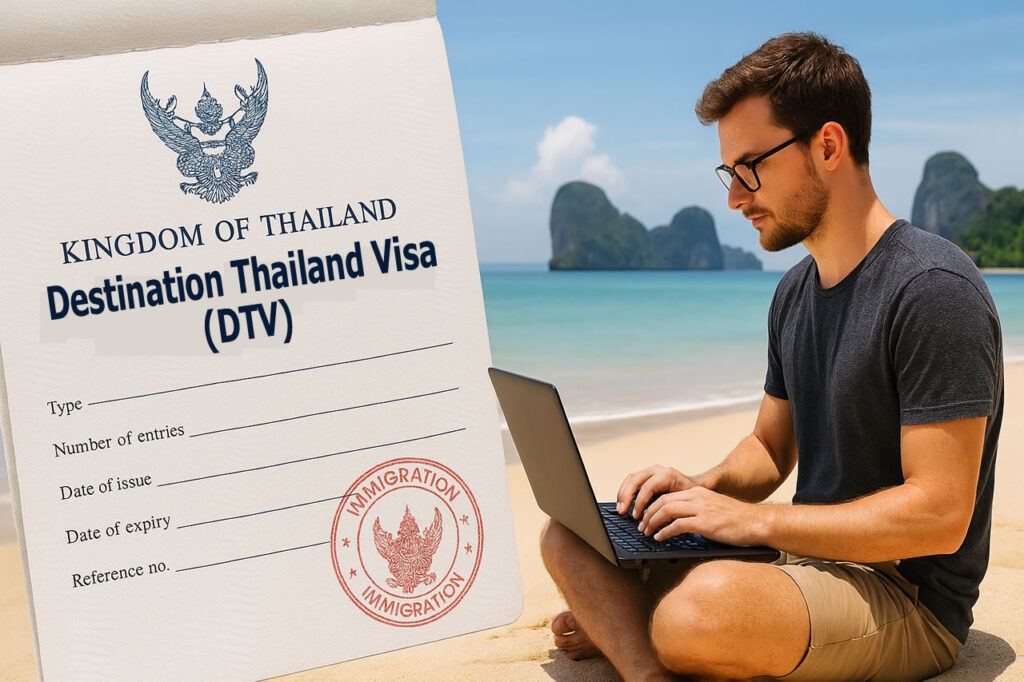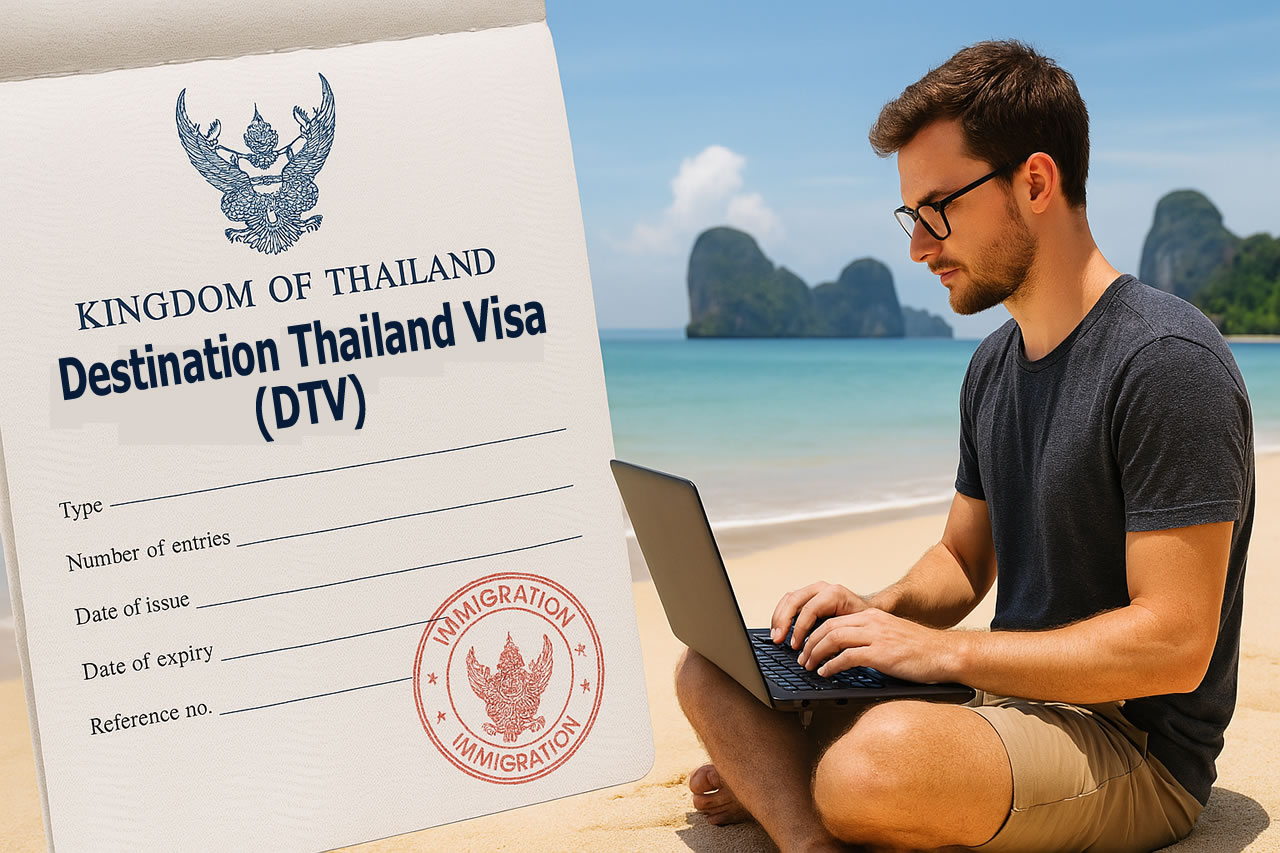
Thailand has long been a top destination for digital nomads, remote workers, and long-term travelers. Recognizing the growing demand for a visa that caters specifically to these groups, the Thai government introduced the Destination Thailand Visa (DTV), which officially launched on July 15, 2024.
This visa is designed for individuals who want to live in Thailand for extended periods while working remotely or engaging in Thai cultural activities. In this post, I break down everything you need to know about the DTV, from eligibility to application and extensions.
Overview of the Destination Thailand Visa (DTV)
- Purpose: The DTV is intended for digital nomads, freelancers, remote workers, and individuals participating in Thai cultural activities.
- Validity: The visa is valid for 5 years from the date of issuance.
- Stay Duration: Each entry allows a stay of 180 days, which can be extended once per stay.
- Visa Type: This is a multiple-entry visa, meaning you can leave and re-enter Thailand as needed during the visa’s validity.
- Application Location: You cannot apply from within Thailand. Applications must be submitted at a Thai Embassy/Consulate or through the online e-Visa portal.
- Minimum Age Requirement: Applicants must be at least 20 years old.
- Family Inclusion: Visa holders can bring their spouse and children (under 20 years old, unmarried).
- Work Restrictions: Holders cannot work for Thai companies or provide freelance services to Thai clients.
Eligibility Categories
The DTV covers two main categories of applicants:
1. Workcation (Digital Nomads, Freelancers, Remote Workers)
This category is tailored for remote workers who are employed by a foreign company or work as independent freelancers. While no specific income threshold has been defined yet, the legitimacy of the employer or freelancer’s work will be considered in the approval process. Applicants should be prepared to demonstrate a stable work history and legitimate employment with overseas clients or companies.
2. Thai Soft Power Activities (Enhancing Thai Culture Internationally)
The Thai government is also using the DTV to promote Thai culture and attract individuals interested in specific cultural and wellness activities. Eligible activities include:
- Muay Thai courses
- Thai cooking courses
- Sports training programs
- Medical treatment programs
- Seminars
- Music festivals and other cultural events
While there is no strict rule on program duration, a course or activity lasting at least six months is recommended for higher chances of approval.
3. Dependents of DTV Holders
Spouses and children (under 20 years old and unmarried) of DTV holders can apply separately for a dependent visa. The financial proof requirement is slightly adjusted to ensure that the main applicant can support their dependents during their stay.
Application Requirements
To apply for the Destination Thailand Visa, applicants must provide the following documents:
General Documents (All Applicants)
- Passport biodata page (with at least six months of validity)
- Recent passport-sized photo
- Proof of current location (such as a passport entry stamp or residence permit)
- Proof of visa fee payment ($400-$500 USD, depending on the embassy)
- Financial proof: Applicants must show at least 500,000 THB (approximately $14,000 USD):
- Official bank statement for 6 months (alternative investment declarations or cryptocurrency are not allowed)
- Payment records
- Letters of sponsorship
Purpose-Specific Documents
- For Workcation (Remote Workers & Freelancers):
- Employment contract from a foreign company
- Employer letter confirming remote work status
- Tax returns (recommended but not mandatory)
- Freelancers should provide an online portfolio, client invoices, or work samples
- For Business Owners:
- Business registration documents from home country
- Tax filings proving business activity
- For Thai Soft Power Activities:
- Course enrollment confirmation
- Business registration of the training institution
- For Dependents:
- Marriage certificate (for spouses)
- Birth certificate or adoption papers (for children)
📌 Some Thai embassies may also request proof of valid health or travel insurance with minimum coverage of $50,000 USD. Always check local requirements before applying.
If your embassy asks for coverage, make sure your plan meets Thai requirements. Find visa-compliant options in our Thailand Health Insurance Guide.
Application Process
How to Apply for the Destination Thailand Visa (DTV)
There are two main ways to apply for the Destination Thailand Visa (DTV): in person at a Thai embassy or consulate, or online through the Thai e-Visa portal. Each method has its own requirements and considerations, so it’s important to understand the process before starting your application.
Applying in Person at a Thai Embassy or Consulate
One option is to visit the nearest Royal Thai Embassy or Royal Thai General Consulate in person to submit your application. However, be aware that not all embassies and consulates accept applications from non-residents. This means that if you are applying from a country where you do not hold a residence permit or a long-term visa, your application may be rejected.
For the best chance of approval, it is generally recommended to apply at the Thai embassy in your home country or country of residence. While not an official requirement, many applicants find that embassies are more likely to process applications smoothly when submitted from their country of legal residence.
Additionally, it’s important to note that Thai embassies operate independently, and their DTV application requirements may vary. Some embassies may:
- Charge different visa application fees.
- Require proof of more than 500,000 THB in your bank account.
- Request additional documentation related to your finances or employment status.
Due to these variations, it is recommended to contact the embassy in advance to confirm their specific requirements before visiting in person.
Applying Online via the Thai e-Visa Portal
If visiting an embassy in person is not convenient, you can apply for the Destination Thailand Visa online through the Thai e-Visa portal. This platform allows you to submit your application digitally, eliminating the need for a physical visit to an embassy.
However, while the application is submitted online, it is still processed by the Thai embassy in your country of application. This means that even though you are completing the process digitally, your application must still be reviewed and approved by a local Thai embassy outside of Thailand.
If you choose to apply online, make sure you meet all the specific requirements of the Thai embassy handling your application. Since embassy policies differ, it’s still a good idea to check with the relevant embassy before submitting your application to avoid delays or rejections.
📌 Regardless of whether you apply in person or online, preparing your documents in advance and confirming the specific requirements of the embassy you are dealing with will help ensure a smoother application process.
Visa Extension
Initial Stay Period
The Destination Thailand Visa (DTV) is a 5-year multiple-entry visa, allowing long-term stays in Thailand with flexible entry and exit options. With a DTV, you can stay in Thailand for up to 180 days per entry before you are required to leave.
After 180 days
Once you reach the 180-day limit, you must go out of the country and come back in again to carry on staying lawfully. Since this is a multiple-entry visa, you are free to exit and re-enter Thailand as often as you wish during the time that the visa is valid.
Extending Your Stay
If you wish to stay longer without leaving, you have the option to apply for a 180-day extension once per year. To obtain this extension, you must visit the Immigration Headquarters in Bangkok, submit the required application, and pay a fee of 1,900 THB. By using the annual extension, you can stay in Thailand for almost a full year without exiting before resetting the process.
Do I have to pay tax?
The Thai government determines if you are liable to pay tax based on the duration of your stay. If you stay in Thailand for more than 180 days in a calendar year, you will be classified as a tax resident under Thai tax law. As a tax resident, you are required to pay Thai income tax on any foreign income that you bring into Thailand. However, if you keep your foreign income outside of Thailand, it will not be subject to Thai taxation.
If your foreign income is earned in a country that has a double-tax agreement (DTA) with Thailand, you may qualify for a full or partial tax exemption, depending on the specific terms of the agreement. To ensure compliance with Thai tax regulations and to take advantage of any possible exemptions, it is highly recommended to consult a Thai tax professional who can provide guidance based on your specific financial situation.
✅ Wondering how to make the DTV lifestyle work financially? This is one of the most popular tools among nomads building remote income streams in Thailand:

Get Straightforward, Affordable Training That Works!
- Step-by-Step Training
- Website Builder & Hosting
- Jaaxy (Keyword Research)
- AI Article Designer
- Live Expert Classes
- On-Demand Webinars
- Business Hubs
- Revenue Opportunity Finder
- Community & Mentorship
- No Upsells, No Contracts!
Not sure the DTV is right for you? There are other long-term visa options worth considering.
If your goal is to enjoy life in Thailand for the long haul—whether to work remotely or simply unwind—the Destination Thailand Visa (DTV) might not tick every box. Fortunately, there are other visa options tailored to different lifestyles and priorities.
- The Long-Term Resident (LTR) Visa is ideal for professionals and skilled workers. It’s especially appealing to remote workers and digital entrepreneurs, offering up to 10 years of uninterrupted stay and tax benefits on foreign income.
- On the other hand, if you’re looking for a more luxurious and flexible experience with minimal paperwork, the Thailand Privilege Visa could be a better match. Formerly known as the Elite Visa, this program offers 5 to 20 years of renewable residency along with VIP services, airport assistance, lifestyle perks, and access to Thailand’s top-tier healthcare and hospitality. It’s a hassle-free way to stay long-term—with comfort, convenience, and zero border runs.
The Destination Thailand Visa (DTV) is a notable step in the right direction for Thailand’s digital nomad and cultural tourism sectors. It offers an affordable long-term stay option for remote workers and those attending skill development programs or actively participating in Thai culture.
The DTV costs considerably less than most other long-term visasavailable in Thailand. But don’t forget the minimum financial requirement of 500,000 THB in the bank as evidence of your ability to sustain yourself financially while in the Land of Smiles. With proper planning, the DTV can be an excellent visa choice for those who want to enjoy an extended stay in Thailand without the complexities of a work permit or business visa.

